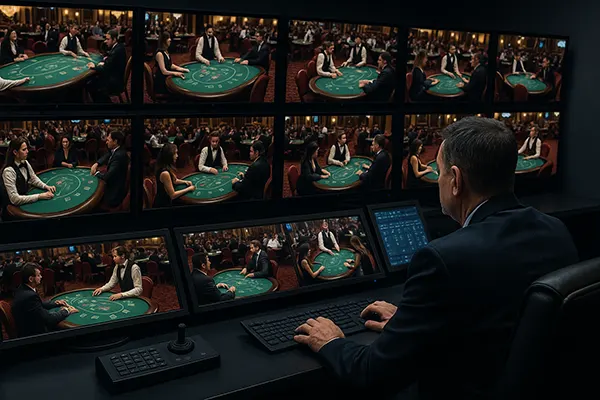
Hole-carding in Modern Casinos: Risks, Ethics and Technological Protection
Hole-carding is a long-discussed technique in the world of gambling, attracting attention from both players and security experts. It refers to the attempt to gain an advantage by glimpsing hidden cards dealt by the dealer. While not considered illegal in many jurisdictions, it is often classified as cheating by casinos, leading to strong preventive measures. In 2025, the practice remains a subject of debate, balancing risk, fairness, and technological countermeasures.
Risks and Consequences of Hole-carding
The main risk associated with hole-carding is the potential ban from a casino. Operators treat any attempt to exploit human error as a breach of trust, regardless of whether local laws explicitly define it as illegal. Players who are caught may face immediate exclusion, confiscation of winnings, or being added to shared watch lists used by casino groups.
Another consequence lies in legal grey areas. In some regions, exploiting unintentional exposure of cards is not punishable under criminal law. However, civil consequences, such as lawsuits or breach of contract claims, can still follow. The uncertainty of legal outcomes adds to the risk for players considering such actions.
From the perspective of personal safety, confrontations with casino security staff can escalate. Even without criminal charges, the damage to reputation and the financial cost of being barred from multiple venues can be severe for professional gamblers.
Impact on the Gambling Industry
Casinos see hole-carding not merely as a minor issue, but as a direct threat to operational integrity. It undermines fairness, which is the foundation of gambling activity. If other customers believe that some players are winning through unfair advantage, the overall trust in the environment collapses.
The financial risks for operators are also considerable. Advantage players using hole-carding can swing odds in their favour, leading to significant long-term losses for the house. This, in turn, influences decisions on game rules, dealer training, and surveillance budgets.
Finally, regulators observe these practices closely. Any failure to protect customers and ensure fair play may lead to penalties, stricter oversight, or in some cases, licence reviews. This makes technological and organisational responses to hole-carding essential for the industry.
Ethical Debates Around Hole-carding
The ethical debate surrounding hole-carding is complex. Some argue that players are simply exploiting dealer mistakes, which makes it more a matter of skill than cheating. Advocates of this view compare it to counting cards in blackjack, another controversial yet technically legal practice.
On the other hand, many consider hole-carding to cross a moral boundary. Unlike card counting, which uses only mental calculations, hole-carding relies on physically spotting information that was not meant to be revealed. This distinction makes it ethically questionable for both casual players and professionals.
The question of fairness is central. Casinos provide games under strict rules and expectations. While operators must minimise their errors, deliberately capitalising on those errors is often seen as a violation of the spirit of fair gambling.
Perspectives from Players and Operators
Professional gamblers often justify hole-carding as a legitimate strategy, arguing that the responsibility lies with casinos to ensure proper dealing techniques. They highlight that if dealers are poorly trained, players should not be punished for observing what is visible.
Operators, however, counter this by emphasising fairness. The average player does not have the skill or training to exploit such mistakes, meaning advantage players create an uneven playing field. This undermines the entertainment purpose of gambling for the wider audience.
Ethics experts also weigh in, suggesting that while not criminal, hole-carding erodes trust between players and casinos. In industries based on risk and chance, trust is essential to maintaining long-term customer engagement.

Technological Countermeasures Against Hole-carding
Modern casinos are increasingly investing in advanced technologies to eliminate the possibility of hole-carding. Automated dealing shoes, where cards are dispensed by electronic machines rather than exposed by dealers, have become common across Europe, the United States, and Asia.
Surveillance systems powered by artificial intelligence now monitor not only player behaviour but also dealer movements. AI-based tracking can identify unusual angles or repeated attempts by players to view hidden cards, allowing for rapid intervention by security staff.
Additionally, training programmes for dealers have been strengthened. New guidelines stress controlled hand movements and awareness of player positions. Combined with strict monitoring, this has reduced the opportunities for advantage play significantly.
Future Developments in Casino Security
By 2025, biometric monitoring is increasingly integrated into gaming floors. Facial recognition helps track known advantage players across multiple locations, ensuring that banned individuals cannot return unnoticed. This reduces the scope for repeat offenders.
Casinos are also collaborating with regulators and sharing security data across borders. International cooperation helps identify patterns of organised advantage play, including groups specialising in hole-carding. This collective effort strengthens industry resilience.
Looking ahead, experts expect further integration of blockchain-based game verification systems. These technologies could provide players with transparency while ensuring that operators maintain full control of card exposure, closing one of the last loopholes exploited by hole-carders.




